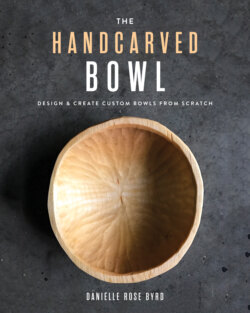Читать книгу The Handcarved Bowl - Danielle Rose Byrd - Страница 50
На сайте Литреса книга снята с продажи.
Оглавление50
T H E H A N D C A R V E D B O W L
Chapter 3 | S H A R P E N I N G
WHAT IS SHARP, EXACTLY?
Buckle up because this one is gonna rock you. If you choose to retain only one nugget
of information from this book, let it be this one, because it will serve you in every
woodworking endeavor from here on out.
Simply put, a sharp edge is
created when one plane perfectly
intersects another along its entire
length. This point of intersection
creates an arris.
THE BURR IS KEY
To start the process of achieving
this arris, one plane (bevel) is
worked with a coarse abrasive
to bring material over the edge,
which creates a burr along its
entire length. This burr is the key.
(For a double-bevel blade like a
knife, this process is repeated on
the other bevel.)
Finer and finer grits are
introduced to the bevel, slowly
removing the previous grit’s
scratch pattern and polishing
the edge. This pushes the burr
back and forth until it breaks off,
creating the perfect arris where
the two planes meet. This is
relatively similar to snapping a
paper clip by bending it back
and forth until it gives.
CONTINUOUS BURR CREATES
A CONTINUOUS EDGE
If the burr isn’t formed along the
full length of the edge, the edge
will have low spots at various
points along its length. For both
planes to meet perfectly, material
must be brought all the way to the
edge. Any disruption in the burr
anywhere down the length of the
edge will create a disruption in the
sharp edge later on—no matter
how much you polish. It is more
efficient to take your time forming
this burr with the coarse abrasives
than prematurely moving to finer
abrasives, only to realize there is
no burr and have to start the whole
process over.
CHOOSE A SYSTEM
& STICK TO IT
A sharp edge requires a few basic
steps and can be translated to any
tool, but there are myriad ways to
get there, which is where most peo-
ple get confused. It’s important that
you choose a particular system and
stick to it; adding or subtracting
variables when you’re not getting
results will only clutter the objec-
tive, making it hard to discern the
very things that are either working
well or causing further issues.
Sharpening kits can vary
greatly from woodworker to
woodworker, so it’s important
that you focus on the concepts
being conveyed by each step when
comparing setups. Only after you
achieve a better understanding of
